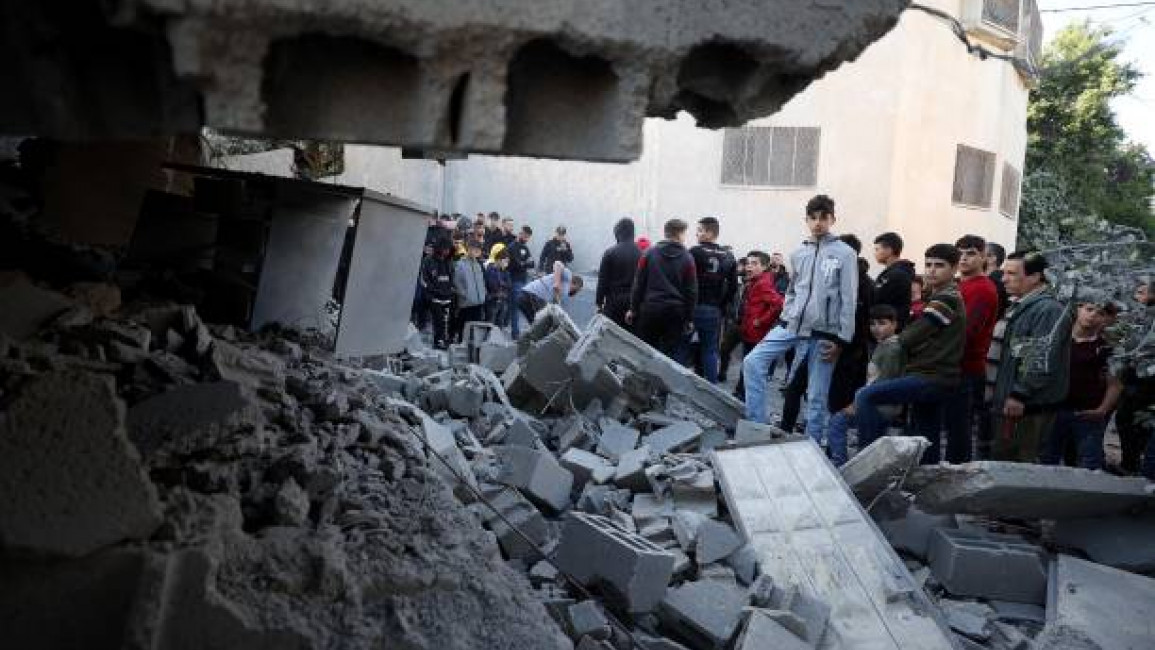Israeli forces destroy homes of two Palestinian families in the northern West Bank
Israeli forces destroyed two Palestinian homes in the villages of Hijeh, east of Qalqilya, and Hares, north of Salfit, in the northern occupied West Bank, last Wednesday. The homes belonged to the families of 18-year-old Younis Hilan, in Hijeh, and 19-year-old Mohammad Souf, in Hares.
Hilan was arrested by Israeli forces in October, and later charged with the stabbing and killing of an Israeli near Nablus. Souf was killed by Israeli forces in the Israeli settlement of Ariel, where he had killed three Israelis and wounded three others. Israeli forces continue to withhold Souf's body.
At dawn, Israeli forces raided the village of Hijeh and began to demolish Hilan's family house. Hilan's mother told The New Arab that the family appealed the demolition order twice, on the grounds that it will displace the family, and that the Israeli military court rejected their appeal.
"Five children, the oldest is 18 and the youngest is four, and my husband and I, all lived in the house," the mother said. "We knew that the house was going to be demolished, so had evacuated it previously, and thankfully we had bought a piece of land where we began to build a new house today."
"The occupation forbid us from rebuilding the destroyed house, and we need to give a sense of security as much as possible to the children," she added.
Israeli occupation forces demolished Wednesday the house of the young Palestinian detainee Younes Heilan in Qalailya in the occupied West Bank. pic.twitter.com/KkFxYyjfoA
— Palestinian hopes (@palestinehopes) May 3, 2023
In the village of Hares, Israeli forces detonated Mohammad Souf’s family’s house with explosive charges, after evacuating 15 families from the surrounding neighbourhood.
"We were informed of the demolition order shortly after Mohammad was declared dead following the Ariel attack, but we didn't know when the demolition was going to happen, we were caught by surprise," Mostafa Souf, Mohammad's uncle, told TNA.
"Occupation forces surrounded the area and began to take families out of the houses surrounding Mohammad's home, while soldiers placed explosives inside the house," he said.
"There were multiple explosions before the house collapsed, and people told us they heard the blast from neighbouring villages," he described.
Watch: As a punitive measure, Israeli occupation forces bomb and demolish the house of Palestinian martyr Mohammad Souf in the village of Haris, west of the occupied West Bank city of Salfit, on Wednesday morning.
— Quds News Network (@QudsNen) May 3, 2023
Souf was killed in November 2022 by Israeli forces after accusing… pic.twitter.com/Q6XUjgdNsj
"The entire family watched the house's destruction, including four children, the youngest being three years old, and my 90-year-old mother, Mohammad's grandmother, all of whom used to live in the house," Souf added. "In my whole life, I only saw houses exploding on TV, like in Gaza, but this time it was our family who was left homeless."
"The eight family members who lost their home, including four children, are now staying at my house until we figure out where to house them," he said.
"In my 90 years of life I saw three states rule Palestine [aside from Israel], but none of them before destroyed people’s houses and threw them out like this," Um Sami, Mohammad Souf's grandmother, told Palestinian media that day from the rubble of her house.
PAINFUL: Palestinian grandmother cries as Israeli occupation forces blow up her grandson's house in Salfit. pic.twitter.com/ChgDbpw2lm
— Kuffiya (@Kuffiyateam) May 3, 2023
"Where will we go now? I spent the night over my daughter," said Um Sami, while in tears. "Let it all be for the sake of Palestine and its youth, houses don't matter, we will rebuild them."
Israeli forces systematically destroy houses of Palestinians it accuses of attacking Israelis. The policy has been described as 'punitive demolition' by human rights groups, who consider it a form of collective punishment that amounts to a war crime.



